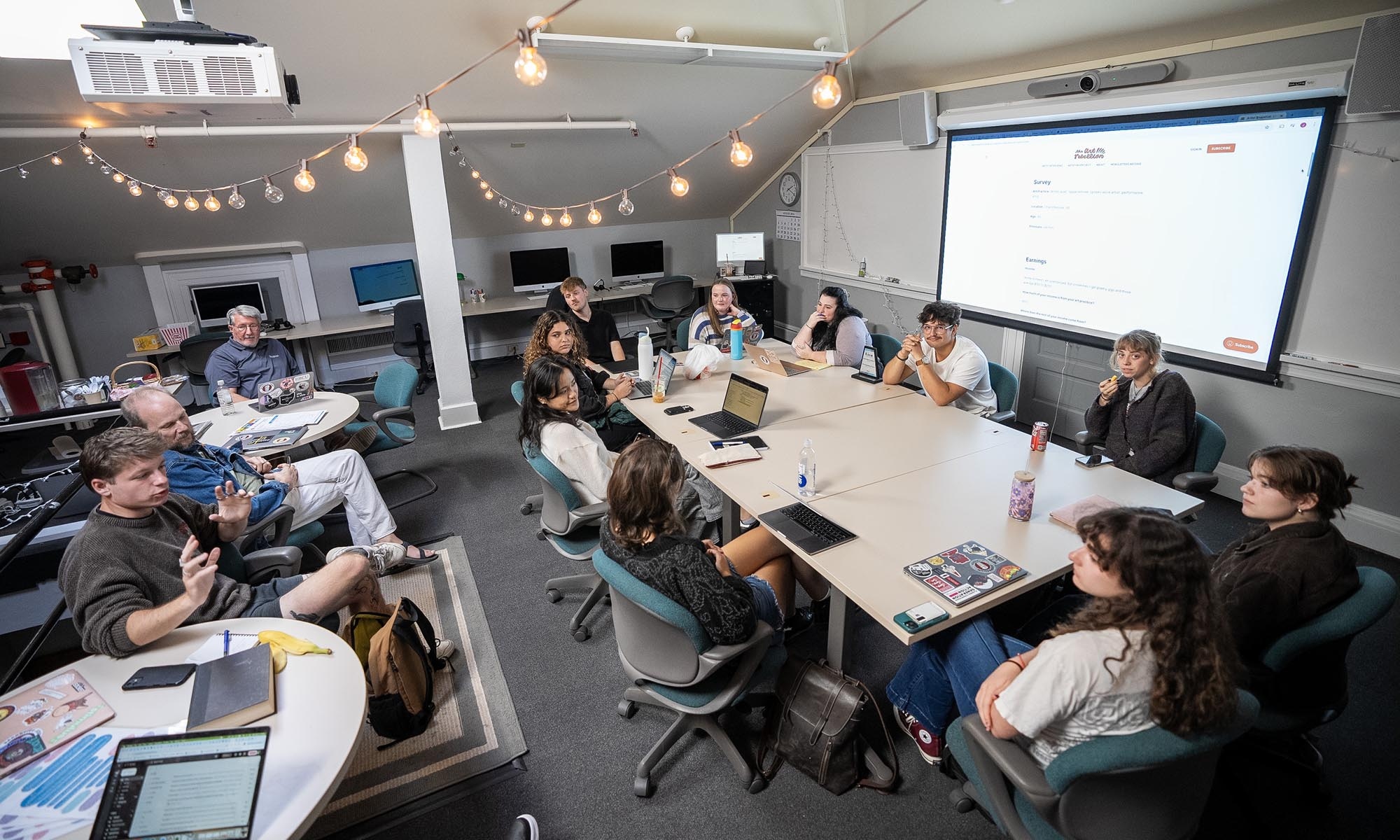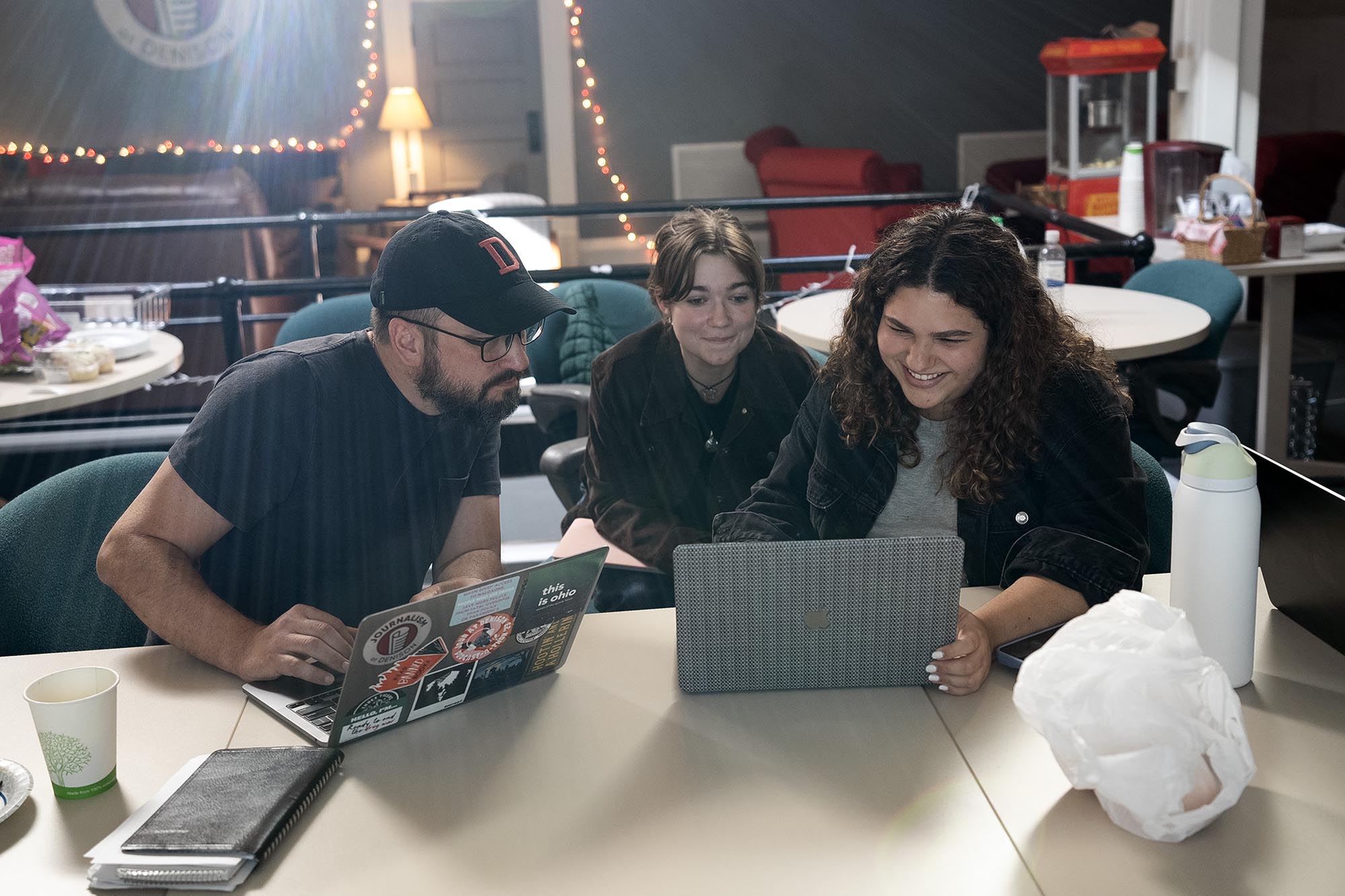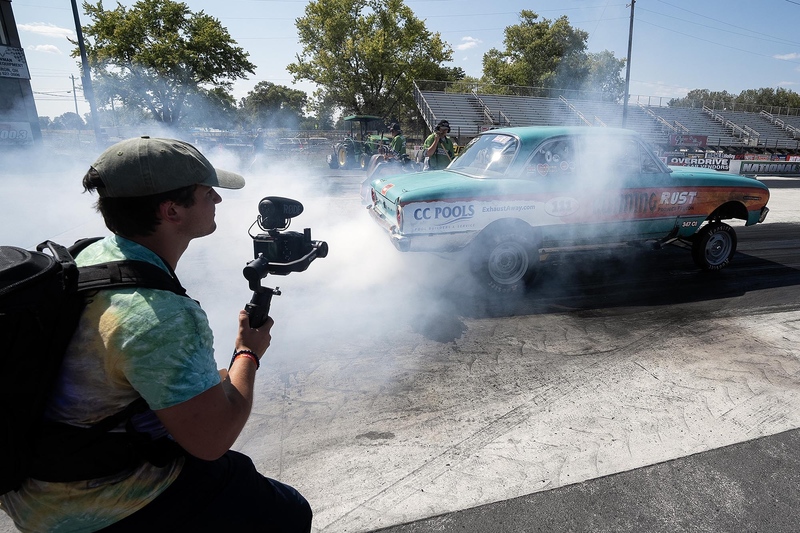On the top floor of Barney-Davis Hall, in a space that resembles a dorm room as much as a newsroom, a team of student reporters dives into another semester of community journalism.
This is the Monday afternoon meeting for the staff of The Reporting Project, the nonprofit news organization of Denison’s journalism program that sends student journalists off The Hill and out into Licking County to report on news as it happens. It is a crown jewel of the college’s growing journalism program.
The meetings are held in what students call the “J-Space,” a lounge for the journalism program with workstations, overstuffed couches, and strings of party lights.
At this particular meeting, there is cake. The staff is celebrating a big win just secured in Chicago, and not in a student contest. The Reporting Project won a national Journalistic Impact Award in the annual competition sponsored by the Local Independent Online News Publishers organization.
They don’t drag out the fanfare. There is news to cover.
“Did everyone see Donna’s story today?” asks Julia Lerner, their managing editor. “It’s a great example of, ‘I don’t care that there was a meeting, I care what was said at the meeting, what happened at the meeting.’”
The students talk about what they’re working on and pitch new stories. Lerner and other attending faculty offer suggestions and talk deadlines.
An arm goes up.
“Y’all don’t need to raise your hands,” Lerner says, smiling.
Her point is one often driven home by faculty: This isn’t a classroom exercise. Don’t think of yourselves as students but as working journalists who are serving a community purpose, filling a void in one of America’s many news deserts.
“People talk about how the news industry is dying,” Lerner says. “I would argue that the news industry is changing, and I think The Reporting Project is evidence of change for the better.”
Barney-Davis was built in 1893, and the building honors that past with dark wood paneling, creaking floors, and transom windows above the faculty office doors.
But the motto of the journalism program housed here points squarely to the future.
“Facts. Empathy. Place. The next generation of storytellers.”
The magic sauce
The program has come a long way in a few short years.
Denison has long offered journalism classes, and more recently had concentrations in narrative nonfiction writing and narrative journalism. But faculty kept hearing from students who wanted more, says professor Jack Shuler, the journalism program director.
“They see history happening, and they want to document it in a way that isn’t just a tweet,” Shuler says. “They’re not buying into the myth that journalism is dying. I don’t believe that either, because I don’t see it dying. I see it happening, and more young people need to be doing the work.”
Denison approved the major and a minor in 2020. Both were offered to students beginning in the 2021-22 school year.
Student interest was swift. By the start of the 2024-25 school year, the department had about 90 majors and minors, Shuler says.
Shuler says the department crafted the major to stand apart from traditional journalism schools and lean into the liberal arts approach to education.
“That’s what the liberal arts does,” Shuler says. “It teaches you how to research, distill ideas, and talk to people. And that’s exactly what journalism does, too.”
“We’re not a technical training school,” says journalism professor of practice Doug Swift, who specializes in documentary and multimedia storytelling. “We’re a place where students grow inwardly in the liberal arts way and also learn the modern landscape of journalism.
“We’re growing whole people,” Swift says. “That is what prepares them for a career, whatever career they choose. That’s the magic sauce.”
As part of a Reporting Project assignment, Owen Baker ’25 and Andrew Theophilus ’25 (pictured above) traveled to Hebron, Ohio, to cover the Hot Rod Drag Week at the National Trail Raceway in September 2024.
‘Get off The Hill’
The course title in the catalog is Experiential Reporting, but the faculty and students know this class by another name.
They all call it “Get off The Hill.”
It’s a philosophy that runs through the program. Good journalism doesn’t happen in a classroom. You have to get out, explore the world, and talk to people.
In fall 2024, Experiential Reporting meant Swift leading trips off campus to report on Licking County farm life. Other classes in the course catalog included professor of practice Alan Miller’s Telling Stories about Place: Rural America and Opinion Writing taught by Pulitzer-winning columnist Connie Schultz, who joined Denison as a professor of practice in 2023.
Shuler and Swift had batted around the idea for The Reporting Project — online at TheReportingProject.org — for a while. They knew students were producing quality work and deserved a place to showcase it beyond Barney-Davis Hall.
Supported in part by a grant from the Andrew W. Mellon Foundation, The Reporting Project gradually found its footing as a steady source for local news in Licking County.
The staff of 10 student reporters fan out across Licking County to cover local news, including big, ongoing stories such as the construction of a massive Intel computer-chip campus on what used to be 1,000 acres of farmland and forest. That coverage helped to win the recent award in Chicago.
Denison students also have broken stories on a local middle school administrator accused of fostering a culture of intolerance and bullying and gaps in National Weather Service radar coverage that leave some rural communities with little or no warning of dangerous storms.
The faculty reports for the site, too, often sharing bylines with their students. Students not on staff can see their stories published on the site if their reporting passes muster.
With Lerner’s arrival in 2023, The Reporting Project site grew to include a weekly newsletter with more than 1,000 subscribers. Access to the news is free, and the team aims to post at least one new story a day. Lerner says they were consistently exceeding that in the fall of 2024.
As a result, The Reporting Project has seen a steady increase in donations from readers, alums, and friends to help support the nonprofit news organization now that the Mellon grant has been expended.
Local newspapers hammered by years of declining circulation and shrinking staff, such as The Advocate in Newark and The Columbus Dispatch, have come to depend on the reporting.
Miller, who began teaching at Denison in 1999, went full-time after retiring in 2022 as the Dispatch editor, a post in which he also oversaw Gannett’s network of 21 daily papers across Ohio. The professor of practice said Denison students are filling a necessary watchdog role when traditional media can’t.
“The smaller the paper, the fewer resources,” he says. “And the editors of smaller papers are really happy to have the stories and photos that we are producing. That also ups the game for the students. They know I’m not the only one who’s going to read their work.”
The Reporting Project has been highlighted by the Center for Community News, a University of Vermont effort that documents and supports university-led local news reporting.
A 2024 analysis by the center found that “student-reported stories were often more in-depth and complex than the coverage produced by professional journalists at other local news outlets, and that they were meeting critical information needs in their communities.”
Emma Baum ’26 spent the summer of 2024 working for The Reporting Project. She had been digging into the story about dead zones in Ohio’s weather radar coverage, and she knew she needed more.
Then an EF-2 tornado tore through the rural community of Frazeysburg, 25 miles east of campus. Baum knew what she had to do.
Get off The Hill.
She hopped in her grandparents’ Honda CRV and drove to Frazeysburg, where rows of corn gave way to ruin. The community had been blindsided by a tornado spun up by an unwarned storm.
On her own, Baum documented the experiences of the shaken residents of Frazeysburg.
“That was a really powerful experience,” she says. “I had not expected people to be that generous with their time and their stories, especially in the middle of chaos.
“I realized what my story was missing,” she says. “It needed people. It needed a heart.”
Bursting the college bubble
Current journalism students and recent alums say such shoe-leather reporting, strong mentorship from faculty, and stellar career guidance from assistant journalism director Beth Lossing prepare them for life, regardless of the career path they choose.
“You need storytellers in every field,” Lossing says. “Knowing how to take esoteric language and tell a story that can reach a general audience, that’s a skill, and a much-needed one.”
By the time Jack Nimesheim ’24 graduated from Denison, he had interned at The Advocate, The Dispatch, and U.S. News & World Report. A fourth internship after graduation at the Chicago office of Zeno Group, a global public relations firm, led to a full-time job a few months later.
Nimesheim loves the job, which involves pitching stories to reporters.
“A journalism degree at Denison will take you a long way, even if you decide not to go into reporting,” he says. “You learn how to write, speak well, and communicate verbally — at a time when a lot of students don’t know how to do that — and get really creative with research. These are skills that can help you with any number of fields.”
Miller, a newsman to his core, loves the reporting he does alongside his students, but he knows the lessons they’re learning will serve them even if they pursue other careers.
“They’re not only learning how to do journalism, but they’re learning how systems are supposed to work, when systems don’t work, how government and business and transportation fit together or don’t,” he says. “They’ll be better at whatever they do because they learned to communicate in this way and learned to research and report in this way.
“I’ve met a lot of really smart people in my time as a reporter who would be a heck of a lot more effective if they had maybe taken some journalism courses,” he says.
Andrew Theophilus ’25, a staff reporter at The Reporting Project, didn’t imagine his years in college would include having local elected officials on speed dial and taking his calls.
“If you talk to students, they will tell you that college is a bit of a bubble,” he says. “What journalism does, it pops that bubble. It truly has shaped my college experience.”
Caroline Zollinger ’25 covers the nearby village of Alexandria, population 500, and her reporting on proposed industrial development there prompted concerned residents to mobilize and protect their small-town way of life. It’s safe to say that Alexandria has not seen this much consistent attention from any news organization in decades.
“It makes me feel good, like I made a difference in their community,” she says.
Zoe Meyer ’24 and Jack Reaney ’22, now working journalists, say the Denison program was invaluable.
“Journalism parlays well with the liberal arts, with the type of person who is very open-minded and curious,” says Reaney, who reports for Explore Big Sky, a Montana news outlet.
“I am someone who is very much a generalist,” says Reaney, who studied creative writing and economics at Denison but didn’t discover journalism until his senior year. “I had drive. I just didn’t know where to take it. Journalism was the place.”
Meyer works for the Sierra Sun, a newspaper covering the Lake Tahoe region. She’s covering a little of everything, and while the pace of small-town newspapering can be relentless, she likes that her work matters.
“I feel a sense of pride in what I do, and I absolutely love delving into people’s stories on a daily basis,” she says.
That’s what the journalism faculty see back on The Hill from their students.
“No one is doing what we’re doing in Licking County, and without us, lots of people would not know what’s going on in their communities,” Lerner says.
“Students know that when they write something, it’s going to go out into the world and make an impact,” Shuler says. “It’s not just for a grade. They’re contributing to the greater conversation. They’re a part of this community. What they’re doing matters.
“This is the real deal.”








